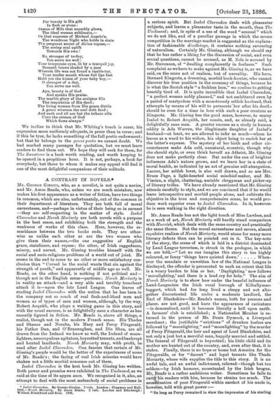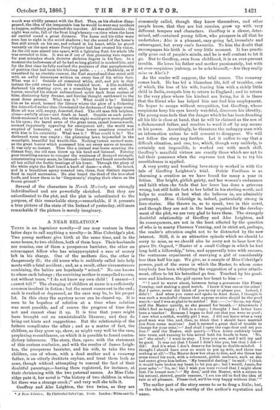A CONTRAST IN NOVELS.* MR. GEORGE GIAMEG, who, as a
novelist, is not quite a novice, and Mr. Amos Reade, who, unless we are much mistaken, now makes his first appearance as a writer of fiction, have two things in common, which are also, unfortunately, out of the common in their department of literature. They are both full of moral earnestness, and—perhaps in virtue of their being so in earnest —they are self-respecting in the matter of style. Isabel Clarendon and Norah Moriarty are both novels with a purpose in the best sense, and exhibiting both the strength and the weakness of works of this class. Here, however, the re- semblance between the two books ends. They are other- wise as unlike each other as are the two women who give them their names,—the one suggestive of English grace, stateliness, and repose ; the other, of Irish raggedness, . misery, and unrest. Mr. Gissing troubles himself with the social and socio-religious problems of a world out of joint. He seems in the end to come to no other or more satisfactory con- elusion than " Cursed be the social wants that sin against the strength of youth," and apparently of middle age as well. Mr. Reade, on the other hand, is nothing if not political and— though not in the English sense—partisan ; Norah Moriarty is in reality an attack—and a very able and terribly trenchant attack it is—upon the late Land League. One leaves off reading Isabel Clarendon with the notion that he has been in the company not so much of real flesh-and-blood men and women as of types of men and women, although, by the way, Robert Asquith, who plays a waiting game in this story, and with the usual success, is as delightfully sane a character as has recently figured in fiction. Mr. Reads is, above all things, a realist, though not in the modern French sense. His Thades and Shanes and Norahs, his Mary and Percy Fitzgerald, his Father Dan, and O'Brannaghan, and Din Shea, are all drawn from the Ireland we know so well, the Ireland of moon- lighters, unscrupulous agitators, boycotted tenants, andbankrupt and hunted landlords. Norah Moriarty may, with profit, be read after Isabel Clarendon. One. fancies that certain of Mr. Gissing's people would be the better of the experiences of some of Mr. Reade's ; the facing of real Irish miseries would have shaken not a little morbid nonsense out of them.
Isabel Clarendon is the best book Mr. Gissing has written. Both power and promise were exhibited in The Unclassed, as we said at the time of its appea ante. We recognised in it, also, an attempt to deal with the most melancholy of social problems in
• Isabel Clarendon. By George Gissing. 2 vols. London : Chapman and Hall. 1886.—Norah Moriarty. By Amos Reade. 2 vols. London and Edinburgh: Blackwood and Sons. 1836. a serious spirit. But Isabel Clarendon deals with pleasanter subjects, and leaves a pleasanter taste in the mouth, than The Unclassed; and, in spite of a use of the word " sensual " which we do not like, and of a peculiar passage in which the severe competition in the marriage market is suggested as the explana- tion of fashionable décolletage, it contains nothing savouring of naturalism. Certainly Mr. Gissing, although we should say that he has rather a liking for the discussion of social, and even sexual questions, cannot be accused, as M. Zola is accused by Mr. Stevenson, of "dwelling complacently in foulness." Such complaint as we have to make against Mr. Gissing is, as we have said, on the score not of realism, but of unreality. His hero, Bernard Kingcote, a dreaming, morbid book-hunter, who cannot discover his true position in the economy of things, because he is what the Scotch style "a feckless loon," we confess to getting heartily tired of. It is quite incredible that Isabel Clarendon, " a perfect woman nobly planned," and not embittered even by a period of martyrdom with a monstrously selfish husband, that attempts by means of his will to persecute'her after his death, should be even for a time in love with such a poor creature as Kingcote. Mr. Gissing has the good sense, however, to marry Isabel to Robert Asquith, her cousin, and, as- already said, a delightfully sane man. A greater success as a study in human oddity is Ada Warren, the illegitimate daughter of Isabel's husband—at least, we are allowed to infer as much—whom he leaves as a ward to his widow, his object being to enrich her at the latter's expense. The mystery of her birth and other cir- cumstances make Ada cold, unnatural, eccentric, though why she should style, or even think herself an Atheist, Mr. Gissing does not make perfectly clear. But under the sun of brighter influences Ada's nature grows, and we leave her in a state of moral health, as indicated by an act of genuine self-abnegation. Lacour, her selfish lover, is also well drawn, and so are Mrs. Bruce Page, a light-hearted social mischief-maker, and Mr. Vissian, a slight, chattering, amiable clergyman and picker-up of literary trifles. We have already mentioned that Mr. Gissing attends carefully to style, and we are convinced that if he would leave introspective and morbid people alone, and cultivate the objective in the true and comprehensive sense, he would pro- duce work superior even to Isabel Clarendon. In it, however, he is seen walking in the right direction.
Mr. Amos Reade has not the light touch of Miss Lawless, and as a work of art, Norah Moriarty will hardly stand comparison with Hurrish, which deals with the same country and practically the same theme. But the moral earnestness and severe, almost repulsive realism of Norah Moriarty, would atone for many more literary defects than can be pointed out in it. The key-note of the story, the scene of which is laid in a district dominated. by Land League terrorism, is struck in the prologue, in which we are told,—" Let no one imagine this story is too highly
coloured, or fancy things have quieted down.' When- ever the mandate or unwritten law of the National League is disobeyed, the offender is persecuted to such an extent that life is a weary burden to him or her. Daylighting ' now follows moonlighting,' and there is a loud cry for help." The aim of Norah Moriarty is to show how under the baneful influence of Land-Leagueism the Irish rural borough of Kilballymac- tagged, which had for long lived a sleepy and not alto- gether discontented life under a moderate landlord, the Earl of Blankshire—Mr. Reade's names, both for persons and places, are not good, and have the appearance of caricature —is demoralised, until it becomes literally a hell upon earth. A farmers' club is established; a Nationalist Member is re- turned in the person of Mr. Denis Dymock, a Liverpool merchant ; the justifiable " evictions " of drunken loafers are followed by "moonlighting," and "moonlighting" by the murder of Percy Fitzgerald, the heir and agent of Lord Blankshire, and not only a just but a merciful man, happily married and settled. The funeral of Fitzgerald is boycotted ; his little child and its mother are hunted out of the country, and, even after that, it is stolen. Finally, there is no hope or home but America for the Fitzgeralds, or for "decent" and loyal tenants like Thade Moriarty, whose wife supplies the title to this story. It is an awful tale, and an awful indictment, relieved—though but too seldom—by Irish humour, accentuated by the Irish brogue. Mr, Reade is a rather ambitions writer. Sometimes he fails to canflsis readers with him, because he strains too much. The assaglAnation of poor Fitzgerald within earshot of his uncle is, howecter, told with great power:—
"So long as Percy remained in view the impression of his sterling
worth was vividly present with the Earl. Then, as his shadow disap- peared, the idea of the irreparable loss he would be were any accident to happen, suddenly galvanised the watcher. All was still outside ; the night was calm, full of the frost king's beauty—a time when the keen air carried sound a great distance. The horse and his rider were soon lost to sight in the weird shadows ; but the sound of the horse's feet still struck on his ear, and echoed in his heart, while he gazed vacantly on the spot where Perey's figure bad last crossed his vision. As the old man stared into space, with a lightning flash his whole life was revealed to him. It was as if out of that gloaming vain regrets for past mistakes shook derisive skeleton fingers in his face. In a moment the hollowness of all he had so long gloried in mocked him, and for the first time he fully realised the poorness of that paraphernalia of position that had been his life-long pride Suddenly, as if transfixed by an electric current, the Earl started and then stood still with an awful intentness written on every line of his white face. What was it ? Outside all remained white, still, and yet in that instant the cold sweat beaded hie wrinkled brow. A film suddenly darkened his starting eyes, as a something he knew not what, of horror, recalled his almost enfranchised spirit back from realms of bliss, shattering fairy dreams, and forcing thought earthward to the most drear present. What was it ? What could it be ? Behind him as he stood, loomed the library where the glow of a flickering fire intensified rather than illuminated the darkness of the large room. Here all was still, empty, deserted, dead. The old man felt helpless, alone—awfully alone—and death at hand. Outside as each pulse- throb weakened at his heart, the white night would grow more ghastly to his eyes ; the bared arms of the great trees, raised heavenwards, seemed impotently appealing for omnipotent aid ; the world was emptied of humanity, and only those lower creations remained with him in his extremity. What was it ? What could it be ? The darkened room was empty ; the glistening lawn bejewelled in the moonlight, beautiful but wraith-like. Nothing human seemed near, as the great horror which possessed him set every nerve at tension. It was only an instant. Then like a trained war-horse scenting the distant fray, the old man threw up his head and listened. Forcing poor trembling nature to conquer the weakness of decayed strength, concentrating every sense, he listened--listened and heard sounds that all but stilled the feeble beatings of his heart. Through the glory of the white night the Earl heard a knell of doom—a shot. He heard, and in a breathless agony counted two, three, four distinct reports fired in rapid succession. He also heard the thud of the iron-shod hoofs, and knew them to be ' Greystone's,' ringing their alarm on the frozen ground."
Several of the characters in Nora, Moriarty are strongly individualised and are powerfully sketched. But they are subordinated to the plot, and the plot is subordinated to the purpose, of this remarkable story,—remarkable, if it presents a true picture of the state of the Ireland of yesterday, still more remarkable if the picture is merely imaginary.



































 Previous page
Previous page